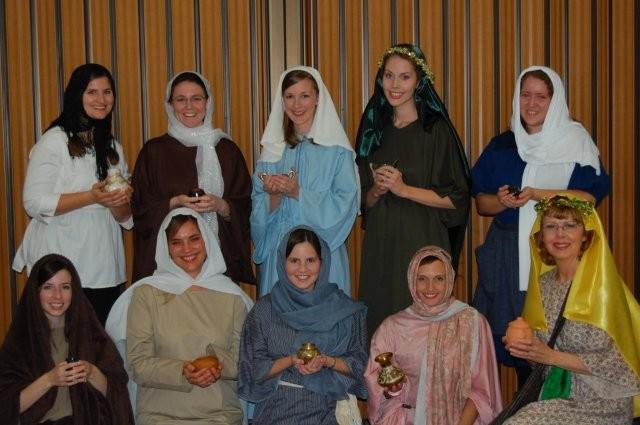Paige, Daniel, and Timothy performed “Jesus has Risen” in our Sacrament Meeting on Easter Sunday. I’m finally getting around to posting a video we recorded at home just previous to the meeting.
Category: Church
You’re invited!
We’re doing an “encore” performance of the Ten Virgins musical program tomorrow, May 3 at 7:00-8:00 at my church. Look at these fun ladies. They sing like angels and they’re beautiful and the parable is so relevant for today. Come! I’ll be nervous, but it helps to look out and see friends smiling at me. Oh, and in case you’re wondering, I play one of the foolish virgins.
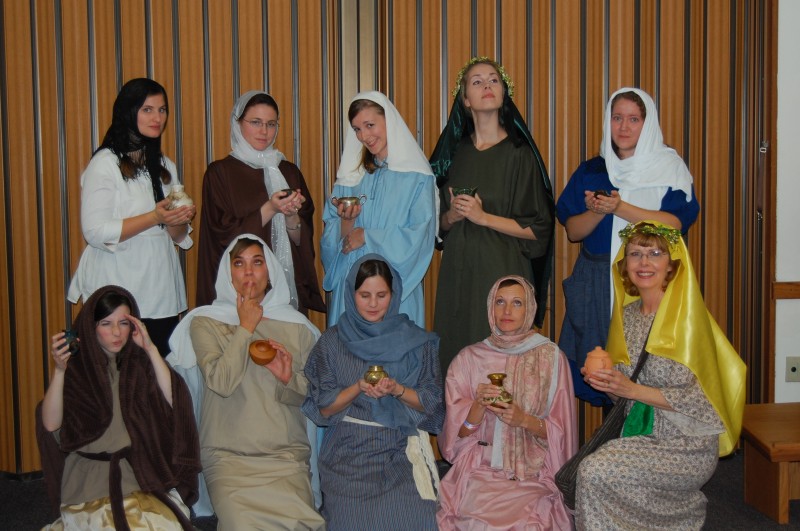
Top 5 Day 5: Teach the Children
In my senior year at BYU, just before student teaching, I took Religion 491 for education majors. This was the most misunderstood, frustrating course for most people. This book, now one of my favorites, was the textbook. It was a chore to read because most of us came into the class expecting a free ride. Hey, we were seniors; it was a religion class…how hard could it be? Neil J. Flinders (the author) was the teacher. This book must have been for him the culmination of a lifelong study of education, religion, history, psychology and management.
This book outlines the decline of moral and religious teaching over time; discusses age appropriate teaching methods; gives concrete examples from the Bible and Book of Mormon and Doctrine & Covenants showing how teaching ought to be accomplished; it identifies 4 different approaches to education (Individual, Societal, Theological, and Agency); it challenges a lot of what I learned in my teaching methods classes because so much educational theory is based on a godless worldview. There is so much in this book that it’s hard to describe it in a neat and tidy synopsis.
How have I applied what I learned in this book?
- Well, for one thing, the book reminds us that parents need to step up and teach their children. No, this is not a homeschool book! Remember, it was written as a textbook for people going out to teach in public schools. This means that we can all be Agency educators, no matter what school our children attend.
- Next, when I decided I wanted to homeschool, I looked around for curriculum. Using this book as a guide, I researched many methods. I realized that this author was right. All curriculum choices fall into one of 4 categories (ok, sometimes it’s a mixture). Many homeschoolers choose Theological method. They believe school, taught from a religious worldview is the tops. That’s good… to an extent, but if such curriculum ignores the needs of an individual and an individual’s right to choose, it’s still not ideal. Classical education is a Societal method. Its goal is to prepare students for the marketplace; to defend their positions through logic and rhetoric learned through drill and intensive study. This is good, in its own way, but it lacks something when the individual’s agency, talents and character education are ignored. The Unschooling movement follows the Individualist model, where the focus is on the individual’s needs above the interests of the group. To me, unschooling stems from an unhealthy worship of the child above God. The individualist model places the ideas and whims of the child above what is moral; what is true; and what God expects parents to teach. The Individualist movement is an extension of the hippie culture into the mainstream. There is an element of truth in the Individualist model, because a good education should be individualized, but not at the expense of truth or some kind of order. We’ve seen the devastating effects of ignoring individuals in schools today. I haven’t met a parent yet who has good things to say about TAKS testing or AIMS testing. Practices that ensure group success so often fail individuals (think of the No Child Left Behind Act).
- I try to use the Agency model of education. I have expectations; I have lists for my kids; I use Theological textbooks, Societal textbooks, and even some days look a lot like Unschooling around here. However, in agency education, all of the subjects we study are not ends unto themselves. They are the means by which we teach our children to develop different capacities. Math teaches logical and deductive reasoning; Arts develop the aesthetic sense and appreciation for God’s creations; History teaches us how to analyze and find patterns… AGENCY implies CHOICE, so truth is taught, but then the individual chooses to act. Most curricula have a goal to see that we learn the subject matter. There are learning and behavioral objectives. Character and capacity objectives are overlooked as educators look to raise test scores and have a measurable outcome. My ultimate goal doesn’t revolve around a GPA. The goal of Agency education is to see that the individual has guided, structured courses aimed to help the individual fulfill the mission God has for him. You can’t measure Agency education by comparing students. The true measure of agency education is the quality of individual it produces.
Be warned that this book is not as organized as I would have it. Like I said before, it is so full that it’s hard to nail everything down. Also, don’t expect this book to tell you everything you need to know to achieve Agency Education. It reminds us of principles and it shares examples of Agency educators and parents to inspire us, but it would go against its own thesis to give an outline of everything an agency educator does. To me, an Agency educator is above all things led by the Spirit. So if anything, agency education centers on character. All subjects, activities, methods, etc. are just appendages to character education.
I could go on about this for a long time. But let me leave you with a summary of what the author thinks an Agency Educator’s home looks like and feels like:
- family learns together
- family prays together
- scripture study is important
- there is a schedule in the home for bedtime, chores, etc.
- the home is orderly
- the family gathers for dinner and good conversation around the table
- family members avoid contention
- the family is happy
- children are taught to take responsibility for themselves
- there is a feeling of safety in the home
- books are read more than television & computer games are used
- there is a feeling of cooperation and understanding
- talents are nurtured and encouraged through family activities, individual practice times, etc.
- character is taught through work, study, service, prayer, and outside activities
So, this book is out of print, but we live in the day of e-bay and amazon.com, so if you really are interested, you’ll be able to find it. I’ve recommended this book for years. Not everyone agrees with me that the book is great. Nor does everyone have the time to read it. That’s why I spent some time writing this post. And now you know just how long-winded I can be. To tell you the truth, I feel like I’ve just scratched the surface and given you a teaser. Most of you are probably asleep or have moved on to facebook or youtube by now. If so, this book is probably not for your personality anyway. It’s philosophy. It’s challenging. It’s what I love to read.
Top 5 Educational Resources Day 3:The Scriptures
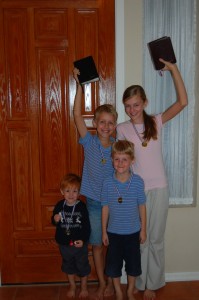
“It is desirable that our children should learn to memorize important passages; such that will leave a strong impression upon their lives; scriptural passages that they will use as their guiding star; scriptural passages that will help to form convictions in their minds of right and wrong; scriptural passages that will bring conviction to their hearts.” (Elder Joseph M Tanner, April 1901 General Conference)
“In the future, infrequent family scripture study may be inadequate to arm our children with the virtue necessary to withstand the moral decay of the environment in which they will live. Where in the world will the children learn chastity, integrity, honesty, and basic human decency if not at home?“These values will, of course, be reinforced at church, but parental teaching is more constant. In my opinion, the teaching, rearing, and training of children requires more intelligence, intuitive understanding, humility, strength, wisdom, spirituality, perseverance, and hard work than any other challenge we might have in life. This is especially so when moral foundations of honor an decency are eroding around us. To have successful homes, values must be taught, and there must be rules, there must be standards, and there must be absolutes.” (James E. Faust, “The Greatest Challenge in the World- Good Parenting, Ensign, Nov 1990, p.33)
- Scripture study at our house begins at 9:00 a.m.
- It takes about 15 minutes. We read from the Book of Mormon, the Bible, and the Doctrine and Covenants. Right now our family is reading the Doctrine and Covenants.
- After we read, we pray.
- Then we sing scripture songs (I make up tunes to scripture verses and we sing to learn the verses) This week we are learning Ephesians 4:11-14.
- We sing a patriotic song
- We say the Pledge of Allegiance
- We each pick a name of a family member out of a box and we try to be a good Samaritan to that person all day.
- The kids have personal scripture study during the day as part of their homework. I give them charts to fill in to show their progress. Here is a chart I made to color as we read the New Testament.

Easter 2009
This was our Easter. The kids decorated eggs after church. We then invited the Dedmone family from across the street to our house for ham, potatoes, asparagus, pineapple, homemade rolls & apple crisp. The Dedmones stayed for a long while so we had a good visit.
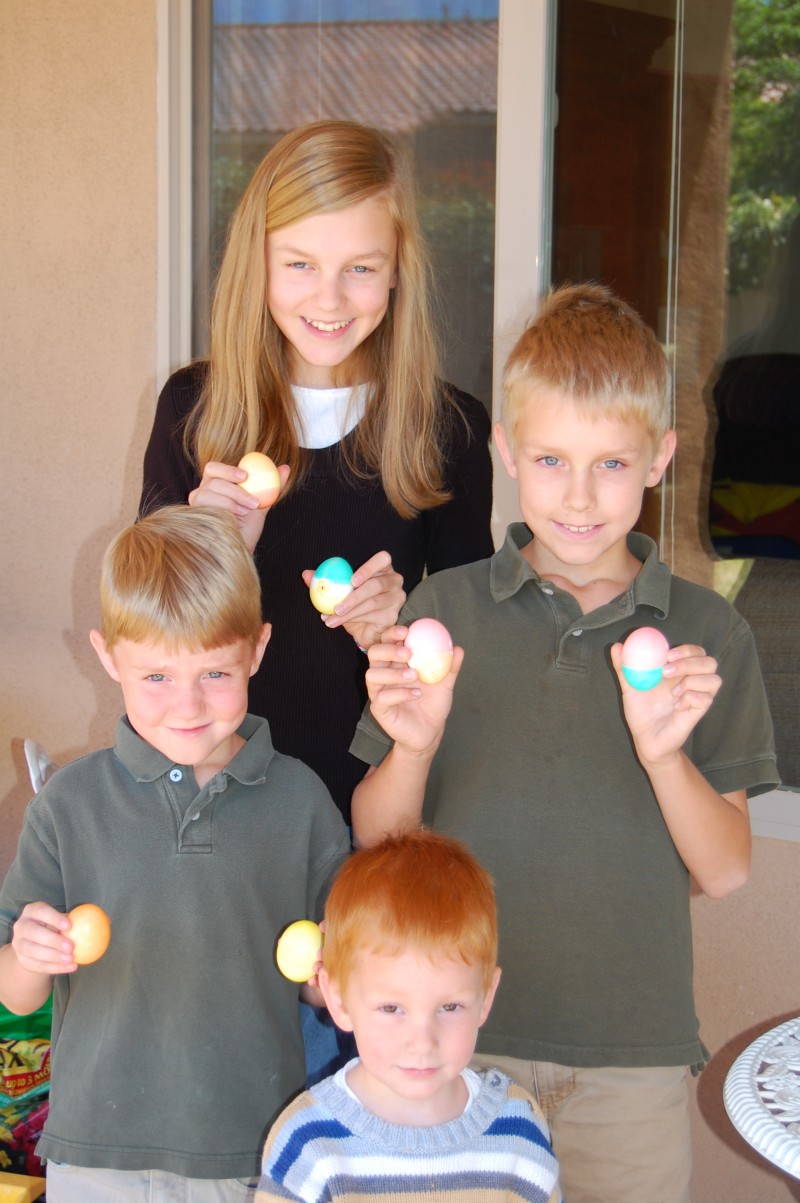
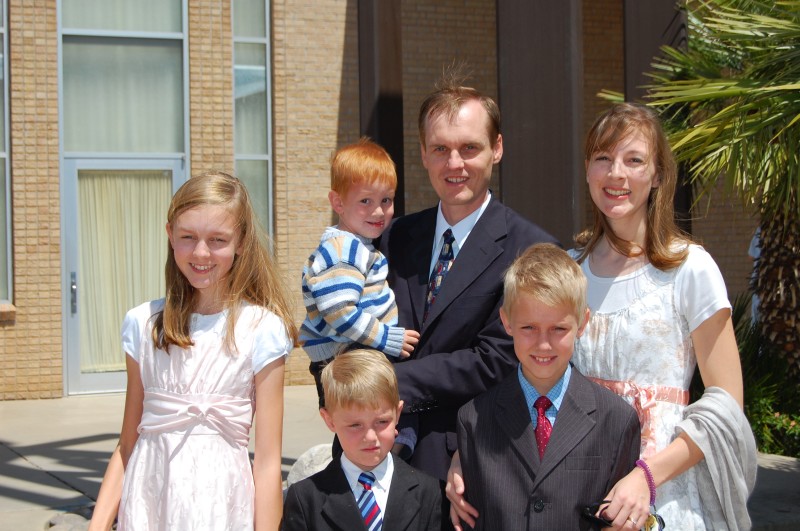
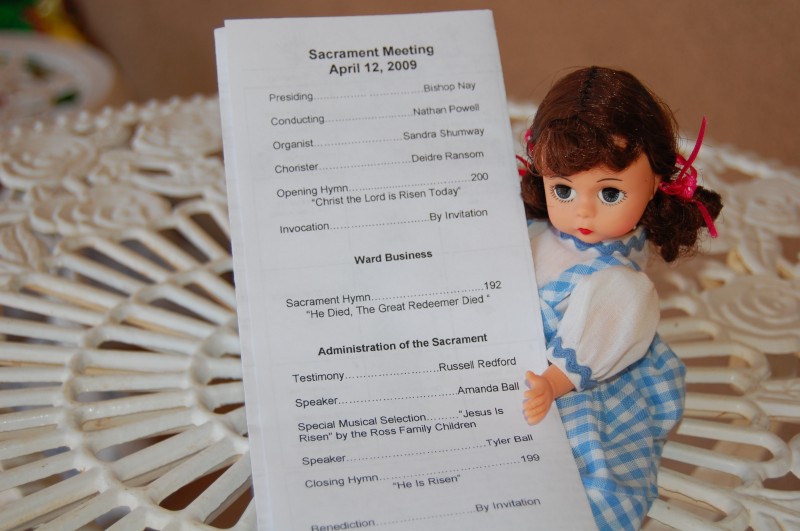
A Musical
